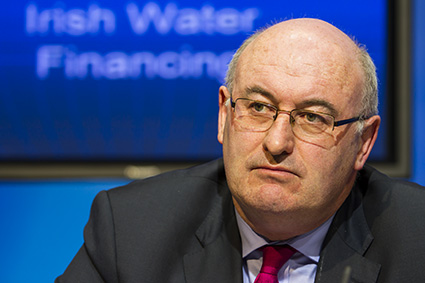Published on
Government outlines free allowance for water and funding for Irish Water

Minister Hogan at the press conference today
The Government today outlined the free allowance for water and funding for Irish Water. Environment Minister Phil Hogan confirmed that the Government agreed that Irish Water’s subvention in 2015 and 2016 will be conditional on the average domestic water charge per household not exceeding €240 per year, subject to final assessment of Irish Water costs by the Commission for Energy Regulation.
The Government’s decisions today include:
- Free allowance of 30,000 litres per household,
- Additional allowance to cover normal water consumption of children under 18 – effectively, water charges will not apply to children
- Funding to Irish Water should allow for an average water charges bill of €240 per year; charging regime to remain fixed until end of 2016
- Free first fix scheme announced for households
- Charges to be capped for people with high water usage due to certain medical conditions
- No standing charge
- Accelerated metering programme
Commenting on the Government’s decision, Minister Hogan said:
At the heart of the Government’s programme of establishing Irish Water is fixing a system that is not fit for purpose: 23,500 people are on boil water notices; 40% of our water supply is lost on leakage; 16% of our water supplies are at risk, affecting over 1 million people; one-third of secondary waste water treatment plants had inadequate effluent standards in 2012; and there is virtually no spare supply capacity in Dublin.With a single new utility – rather than 34 – providing water services more cost effectively, we can address these challenges, manage the €11 billion asset base more efficiently and provide the security of water supply that can attract water-intensive industries such as ICT, pharma-chem and agri-food at a time when a growing number of economies are experiencing water shortages. Irish Water will be able to begin the process of increasing water infrastructure annual investment from about €300 million to around €600 million in the years ahead. This investment could not be funded alternatively without major cuts to public services such as health and education.
For further details, see the full press release
here.